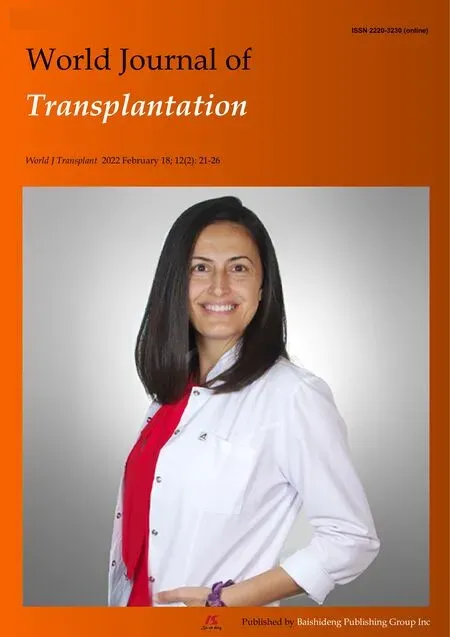Assessment of advanced age candidates for liver transplantation warrants more caution
Alessandro Parente, Vincenzo Ronca
Alessandro Parente, Vincenzo Ronca, Liver Unit, Queen Elizabeth Hospital University Hospital Birmingham NHS Foundation Trust, Birmingham B15 2TH, United Kingdom
Vincenzo Ronca, Centre for Liver and Gastrointestinal Research, Institute of Immunology and Immunotherapy University of Birmingham, Birmingham B15 2TT, United Kingdom
Abstract For patients with fulminant liver failure and end-stage liver disease, liver transplantation remains the only effective treatment. Over the years, as a result of the ageing population, the average age of liver transplant donors and recipients has increased and currently about one quarter of patients receiving transplantation in the United States are above the age of 65. Recently, a study reported that patients aged 65 years or older had lower one-year survival compared to a younger cohort. Herein, we express our opinion about this interesting publication.
Key Words: Liver transplantation; Elderly patients; Age in liver transplantation; Frailty;Transplant assessment; Liver transplant outcomes
TO THE EDITOR
We read with great interest the study from Klebet al[1]. The authors analysed the outcome of 260 elderly patients (65 years old) undergoing liver transplantation (LT)with the aim of identifying features associated with futility, defined as death within 90 d post transplantation. In this retrospective study, Klebet al[1] demonstrated that congestive heart failure (CHF) is strongly associated with futility of LT in elderly patients. Furthermore, patients aged 65 years or older had even when adjusting for severity of liver disease and comorbidities.
LT is a life-saving procedure and it is the only efficient treatment for chronic liver diseases and acute liver failure. However, organ shortage is one of the main challenges that the transplant community continues to face. Indeed, donor availability is becoming an increasing problem globally, limiting the wider spread of LT. As a result of the ageing population, average age of donors and recipients has increased throughout the decades and about one quarter of LT recipients in the United States are over the age of 65[2]. In addition to the standard transplant assessment, when considering patients in this age group, close attention should be paid to cardiovascular diseases, frailty and performance status. Commonly, elderly recipients have more medical conditions, higher waitlist and post-transplant mortality as opposed to a younger cohort.
In a large study it has been demonstrated that, in recipients without hepatocellular carcinoma, advanced age at registration has been shown to be a considerable risk factor behind patients being too unwell to undergo transplantation and it has been linked with higher waitlist mortality[3]. With a competing risk analysis, Suet al[3]have shown interesting results with regards to age and transplantation. In fact,patients aged 64 to 69 years displayed higher waiting list mortality with an adjusted hazard ratio of 1.73 as opposed to 2.04 for those aged ≥ 70. In addition, age was linked to less likelihood of LT, with an adjusted hazard ratio of 0.89 and 0.86 in patients aged 64 to 69 years and ≥ 70 years, respectively.
This is one of several studies which highlight the relation between advanced age and LT outcomes. Interestingly, the authors identified CHF to be strongly associated with poor outcomes. Although the results by Klebet al[1] are compelling, they need to be interpreted with caution. The data presented have been retrospectively reviewed,but some important indexes to estimate frailty and comorbidities, such as the Charlston Comorbidity Index[4] and Liver Frailty Index[5] have not been calculated.This would add a more precise evaluation of the pre-transplant status and comorbidities of the recipients that can influence outcomes. Secondly, the causes of death within 90 d from LT have not been reported. Therefore, it is difficult to estimate the clear relation between advanced age alone and futility, as death could be related to post-operative complications such as graft dysfunction, infection, or immunosuppression rather than recipient age itself. Thirdly, the cohort for this study is from a single-centre, hence as yet we cannot translate this to a broader population.
By way of conclusion, the authors have to be congratulated for their work. They have demonstrated with a well-conducted analysis that recipients aged 65 years and older had increased mortality at one year compared to patients below the age of 65.This finding is of great interest and warrants a thorough assessment of potential recipients with advanced age. In particular, as underlined also by other authors[6], a meticulous pre-transplant cardiological evaluation appears to be of high importance in elderly. Identifying additional pre-operative factors that can guide the decisionmaking to select low-risk patients in a wider population would be of great interest.
ACKNOWLEDGEMENTS
The authors express their gratitude to Mr. Richard W Laing from University Hospitals Birmingham, United Kingdom, for his invaluable contribute to the English editing of this manuscript.
 World Journal of Transplantation2022年2期
World Journal of Transplantation2022年2期
- World Journal of Transplantation的其它文章
- Immunosuppressive regimens and outcomes of inflammatory bowel disease patients requiring kidney transplantation
